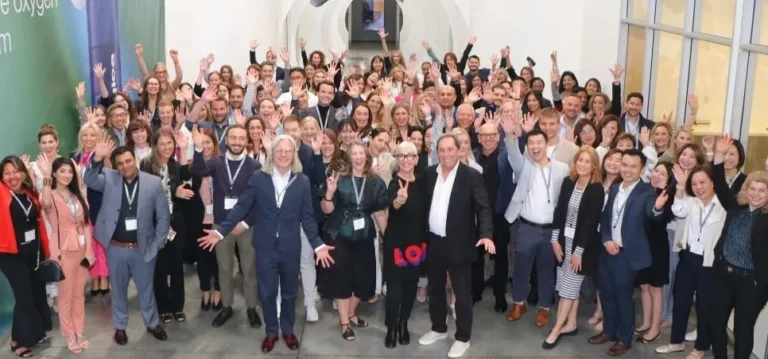Dean DeBiase is a best-selling author and Forbes Contributor reporting on how global leaders and CEOs are rebooting everything from growth, innovation, and technology to talent, culture, competitiveness, and governance across industries and societies.

How Small Business Entrepreneurs Can Level Up With AI

By Dean Debiase
November 9th, 2023
As Sam Altman joins Microsoft and OpenAI names yet another CEO since his chaotic ouster, technology continues to advance at an increasingly rapid rate. Those outside all of the tech industry buzz, including small business owners, are often left behind and competitively disadvantaged. Their competitiveness is about to change—for the better.
The release and adoption of various generative artificial intelligence tools and products caused a mainstream shift in November 2022. ChatGPT became the buzzword in the world’s boardrooms, on social media and at dinner parties, ushering in an AI divide, where a segment of the population fully embraced this technology, another was wary, and everyone else unsure.
Since then, global tech providers, like Intuit, GoDaddy and Zoho have been scrambling to accelerate AI enabled products and services that can make an impact — especially GenAI.
What Is AI’s Impact on SMB
As Sasan Goodarzi, president and CEO of Intuit, who I interviewed on my podcast, puts it, “AI presents the next tectonic shift in technology and will be the greatest driver of innovation since electricity and the internet—and generative AI is transforming the way humans interact with computers.” He is building on and enabling their deep data DNA culture, “We’re now expanding our platform to include the Intuit Generative AI operating system (GenOS), a proprietary capability that empowers Intuit technologists to design, build and deploy breakthrough GenAI experiences.”
But with all of the investment going on, according to a recent survey from GoDaddy, only 33% of small business owners can explain what GenAI is, leaving many entrepreneurs confused or apprehensive, and trailing behind. See, you’re not alone.
With only 11% of respondents using generative AI tools for their business, and well over half (57%) interested in using AI tools, there’s an education gap among small business owners on the best ways to deploy this new technology.
Many companies brought in a slew of new AI tools and product offerings, but what’s far more critical is educating business owners and consumers on the depth of these new tools.
“At GoDaddy, we’ve devoted our entire team to assist entrepreneurs and small business owners in leveraging generative AI for their business,” said GoDaddy, U.S. Independents President Gourav Pani in our interview. “Educating them on these capabilities so they can level up and compete is critical to the success of small businesses.”
It’s Not About AI. It’s What It Could Do For You
Raju Vegesna, COO of Zoho Corporation North America and Chief Evangelist, who I talked with at their Zoholics Conference, thinks the tech industry and ecosystem seems to be more excited about GenAI than the average SMB client. “Rather than wasting time convincing users of the benefits of AI, the real success is when people don’t know, or can’t tell, that they’re using AI at all but are benefiting from the technology. That level of invisibility is a good sign for adoption of the technology; if we have to use the buzzwords all the time, this typically means we are early in the cycle.”
He believes that the real innovation is ahead of us and real use cases will start to trickle in over the coming quarters and years.
Zoho’s strategy, is also evolving to where the hockey puck seems to be going, as they integrate AI and other enabling technologies across various products contextually for the benefit of SMB’s. “That remains the goal for us – enhanced user productivity and benefits from the core day-to-day applications. Not just using AI, for the sake of using it, or because it is the latest trending capability.”
When I talk with SMB’s and entrepreneurs, they all want help with growth, without all the tech. fuss. Goodarzi agrees when talking about Intuit developments: “[small businesses] will know and be able to take action on what products and services to sell more of, how to optimize pricing, how much to invest in marketing, which channels to invest in, how much capital to take, when to pay it back, know when it’s time to buy more inventory and hire more employees.”
To reduce the education gap, GoDaddy launched a free AI Prompt Library offering small business owners a guide on ways AI can help them save time while growing their business. Curated to address common themes business owners need to be competitive in today’s business landscape, the library is a useful addition to every small business owner’s toolkit so they can learn how to use AI to assist with most all areas of a business.
The AI Prompt Library additionally provides directions on ways entrepreneurs can use chatbots such as ChatGPT, Google Bard and Bing AI. GoDaddy is actively working to create a self-service platform that would allow customers to collectively use these tools without having to log into different chatbots.
In addition to the prompt library, GoDaddy launched various AI-powered products created with business owners in mind. Based on a Spring 2023 survey from the Venture Forward research initiative, marketing is one of the top challenges entrepreneurs face when starting a business. That’s why they built GenAI tools to help entrepreneurs save time on tasks such as responding to customer service messages, building a website, writing product descriptions, and creating Facebook and Instagram ads.
AI will become more impactful on platforms that can more broadly understand your company, like Intuit: “We see all of your money coming in, we see the customers that you serve, we see the vendors that you serve, and we see all the employees that you have. So there’s a lot of data that we have access to – we leverage that data to really help them make decisions”, said Goodarzi.
Practicing Responsible AI
While GenAI can be a helpful tool, it does come with limitations and challenges. To educate small business owners, GoDaddy created a resource guide detailing the risks of AI chatbots and ways to use the technology responsibly. The guide covers concerns including inaccurate, misleading or inherently outdated information; bias in AI and chatbots; data privacy; plagiarism; intellectual property; the potential to cause real-world harm; environmental impact; and the possibility of AI addiction or overreliance.
While many vendors are jumping on the AI bandwagon, fundamental aspects should not be ignored—like privacy and transparency. Zoho’s Vegesna agrees, “We think context, privacy and value remain the key tenets of our AI strategy, which is why we ensure our customers are aware of what’s at stake.”
Educating entrepreneurs and consumers on the pros and cons of GenAI will continue to be a hot topic, and providers need to provide balanced insights, so people can make thoughtful decisions on whether to use these new tools for their businesses.
Leveling The Playing Field
Technology providers are starting to recognize that small businesses lack the time and resources to effectively use data when tailoring products and finding or engaging with customers. Large corporations have teams of developers, copywriters and marketers that create strategic language to capture the attention of their target audiences, and generally have access to more sophisticated tools that analyze the data to understand what their patrons want.
GoDaddy thinks GenAI has democratized access to this information, and by using this technology, small businesses now have a resource that provides them with precise information collected from vast amounts of data that they can use to propel their business forward. They continually update their Empower by GoDaddy curriculum, a global social impact program that supports historically overlooked entrepreneurs with small business workshops and self-guided curriculums; one-on-one, group mentorship and coaching; a support network; and wraparound services such as childcare, transportation and technology to eliminate barriers to participation.
I checked out one of their customers, Phoenix, Arizona-based Ade McCray, founder and CEO of Pilates King LLC and a graduate of Empower by GoDaddy, where he learned how to use ChatGPT and other AI tools to assist in developing his business plan. In an email exchange McCray said, “Empower was most helpful to me in regard to advertising. I learned the best practices when it came to using GoDaddy Studio and ChatGPT, which assisted in problem-solving, as well as helping me formulate and fine-tune many ideas I had for my business.”
Zoho’s approach has been to empower SMB’s, with a suite of tools, from the very beginning of their startup journeys—with a few new platforms just launched. Vegesna offers some proof, “Many of our products are built to serve businesses from Day 1 through filing necessary legal paperwork through Zoho Start, which also offers integrations with things like Zoho Domains to create a business website, or utilizing Zoho Solo’s mobile-only experience to help the busiest of solopreneurs with their everyday tasks, all while on the go.
SMB providers who will win are the ones who recognize their customers aren’t technical, don’t want to know how things work, are extremely busy and mobile—and need things dummied down. Vegesna’s states, “With LandingPage, we take out the need to know how to code in order to build impressive landing pages that help businesses grow their online presences while Bigin/Zoho CRM allows them them to alleviate stress that might be associated with using a full suite of irrelevant features.” Intuit’s Goodarzi emphasizes GenAI is in Mailchimp where “a new email content generation solution empowers users to create marketing copy that they can easily drag and drop into emails they’re sending to existing and prospective customers.”
Small business is the lifeblood of most economies, and as technology evolves, SMB’s need to become more competitive in order to drive growth in a digitally enabled landscape. The race is on, and as enabling platforms leverage GenAI, they have the opportunity to save busy entrepreneurs time and energy, while more importantly helping to drive growth, customers and revenue. Goodarzi is betting on it, “it’s [AI] giving us the ability to go from building platform capabilities so the customers can do the work, to platform capabilities where we do the work for the customer and propose decisions for them. Our vision is to become the financial assistant in our customers’ pockets that fuels their livelihoods and, in turn, creates a thriving economy.”
For SMB’s and GenAI—sooner the better.






